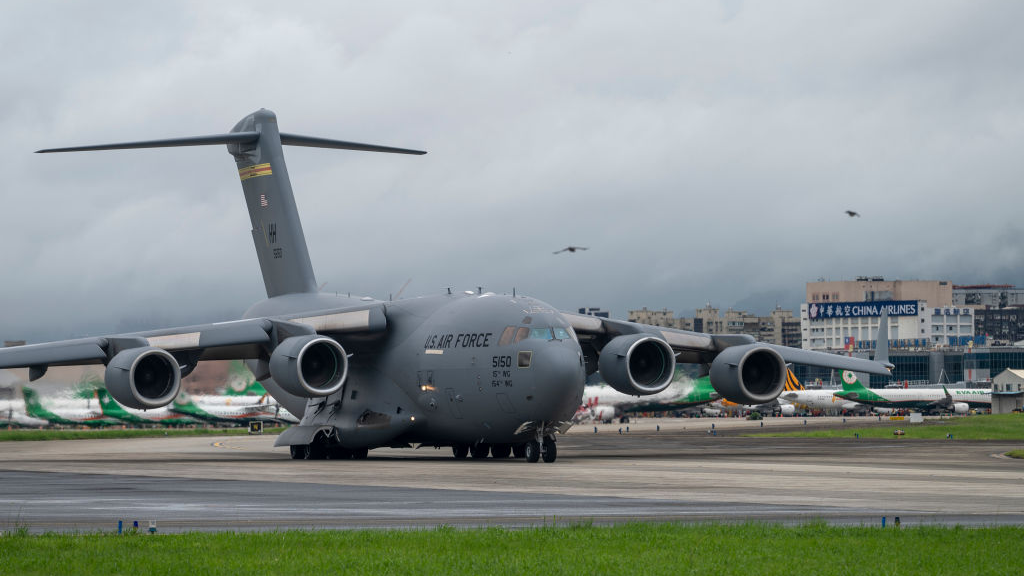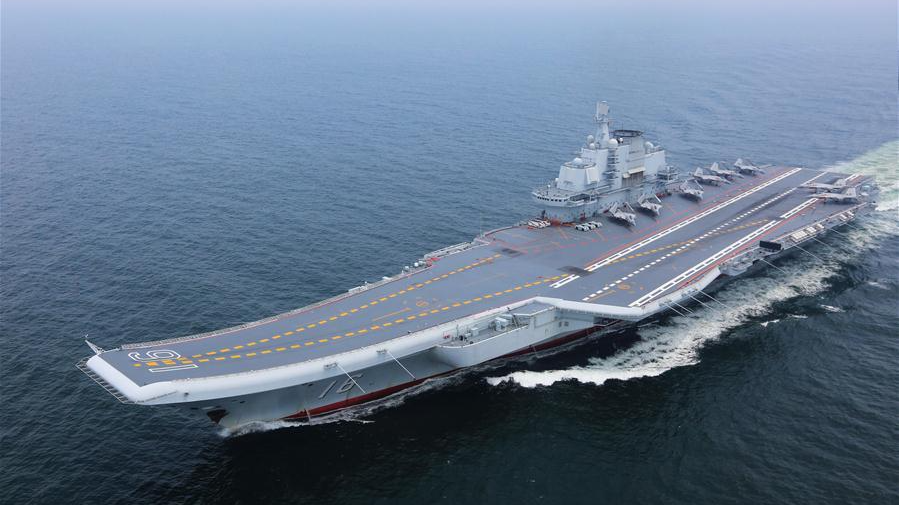
U.S. Air Force C-17 Globemaster III transport aircraft landed at Taipei Shongshan Airport, Taiwan, China, June 6, 2021. /Getty
U.S. Air Force C-17 Globemaster III transport aircraft landed at Taipei Shongshan Airport, Taiwan, China, June 6, 2021. /Getty
Editor's note: Hannan Hussain is a foreign affairs commentator and author. He is a Fulbright recipient at the University of Maryland in the U.S., and a former assistant researcher at the Islamabad Policy Research Institute. The article reflects the author's opinions and not necessarily those of CGTN.
On July 15, a U.S. Air Force aircraft made an unannounced stop in central Taipei, representing a dangerous and deliberate miscalculation of China's ability to exercise complete authority over its territory and all associated approvals for foreign military aircraft landing. The instance fits into a broader pattern of U.S. efforts longing to underestimate the weight of the one-China policy through implicit territorial provocations, and to indirectly whip-up fruitless symbolism to court "Taiwan independence" separatists. "We solemnly warn the U.S. not to play with fire and immediately stop its risky and provocative actions, not to send a wrong signal to 'Taiwan independence' separatist forces and avoid exacerbating tensions in the Taiwan Strait," warned a Chinese defense ministry spokesperson last week.
Coming to terms with China's calculus on national defense is therefore in Washington's immediate interests. The alternative? An end to Washington's leeway on repeated warnings.
Last Thursday's landing qualifies as an unmistakable breach of the landmark China-U.S. joint communiques of past decades for several reasons. First, it is a scathing indictment of Washington's own recognition that "all Chinese on either side of the Taiwan Strait maintain there is but one China." Note that Biden administration officials, despite their insistence on standing by the one-China policy, risk fracturing America's official position on the matter when official U.S. aircraft follow nods to touchdown in Taiwan twice within two months.
Worth reminding Washington is that the three China-U.S. joint communiques never prepared the ground for a mutually acceptable framework on the Taiwan issue by entertaining plurality on China's territorial defense. That right rests with China's central government alone. This is an important distinction at present because the U.S. military aircraft's landing in Taipei assumed a false sense of legitimacy on Washington's part, apparently to support a so-called personnel changeover at the controversial American Institute in Taiwan (AIT), effectively presuming China's sovereign defense contours as lax.
But as a glaring reminder from the Taiwan Affairs Office of the State Council separately reaffirms, military contacts that end up assuming any potential shape between Taiwan and the U.S. are beyond all bounds of toleration. The same applies to the Chinese central government's unchallenged redlines on Taiwan, a matter of firm sovereign importance. And so by pushing the boundaries of Taiwan's absolute centrality to the Chinese mainland, the Biden administration would be the one driving itself deeper into the clutches of gross sovereign interference, where the room for levity is minimal and the space for facing "serious consequences" from China all too certain.

China's aircraft carrier Liaoning is seen during a new training mission upon arrival at an unidentified sea area, July 13, 2017. /Xinhua
China's aircraft carrier Liaoning is seen during a new training mission upon arrival at an unidentified sea area, July 13, 2017. /Xinhua
Interestingly, the timing of Thursday's landing offers clues into the Biden administration's growing doublespeak on the Taiwan issue. Top White House official on the Indo-Pacific region Kurt Campbell recently signaled the administration's unwillingness to cross China's sovereign parameters on Taiwan. But in the same breath, Campbell appeared to rationalize the trajectory of U.S. messaging on Taiwan as some sort of support for a "strong unofficial relationship."
Taiwan's Democratic Progressive Party authority has been a key witness to how the U.S. has used such "unofficial" relationship conjecture to squeeze through delegations in recent times, raise the specter of military threats, and extend patronage to Taiwan separatist forces – all while fishing for gray area on a matter of iron-clad one-China unity. "Making provocations and seeking 'independence' by colluding with external forces will only lead Taiwan into a dangerous situation," cautioned the defense ministry on Thursday.
The warning, taken in the context of the military aircraft's landing, serves as cardinal guidance for the DPP to end the conflation between unofficial and official foreign signaling on Taiwanese independence, and to deny foreign forces unchecked liberties to question China's territorial integrity.
The latter is the same degree of resistance that intervening powers would invoke as dogma on their sovereign fronts, once questioned. The difference lies in their ability to formidably protect territorial interests with half the force of the Chinese people, operate on an internationally accepted one-China consensus, and further a deep-seated reunification resolve, as Beijing readily demonstrates.
This all suggests that Washington's risky provocations vis-à-vis Taiwan are prone to backfiring, and that any persistent attempts to underestimate China's sovereign defenses would deliver history's verdict on foreign collusion.
(If you want to contribute and have specific expertise, please contact us at opinions@cgtn.com.)

